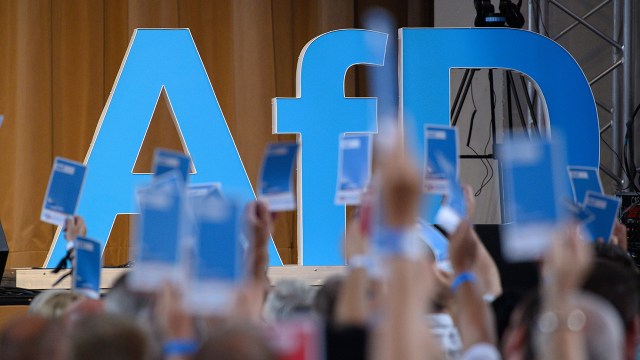
Earlier this month, Alternative for Germany (AfD) became the first far-right political party to win a state election in Germany since World War II. With additional state elections coming up on Sept. 22 and federal elections about a year away, here are some key facts about AfD and its supporters, based primarily on a Pew Research Center survey of 1,008 German adults conducted Jan. 11-March 20, 2024.
This Pew Research Center analysis highlights key findings about Germany’s Alternative for Germany party (AfD) following recent state elections. The analysis draws on a nationally representative survey of 1,008 German adults conducted from Jan. 11 to March 20, 2024. The survey was conducted over the phone.
Throughout the analysis, we analyze respondents’ attitudes based on their favorability of AfD. We categorize respondents as being “AfD supporters” if they have a very or somewhat favorable view of the party, while “nonsupporters” are those who have very or somewhat unfavorable views of AfD. Those who did not answer the question are excluded from the analysis.
To compare educational groups, we standardize education levels based on the UN’s International Standard Classification of Education (ISCED).
Prior to 2024, combined totals were based on rounded topline figures. For all reports beginning in 2024, totals are based on unrounded topline figures, so combined totals might be different than in previous years. Refer to the 2024 topline to see our new rounding procedures applied to past years’ data.
Here are the questions used for the analysis, along with responses, and the survey methodology.
Around one-in-five Germans (19%) see AfD favorably, but a large majority (79%) have a negative opinion of the party. Germans with lower levels of education are 10 percentage points more likely than those with higher levels of education to express a positive opinion of the party (22% vs. 12%). Men also have more positive views of AfD than women do (26% vs. 11%), and the share of men holding this opinion has risen 10 points since 2022.
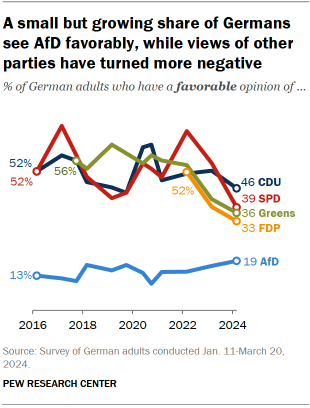
AfD has become more popular in recent years. Today, 19% of German adults have a positive view of the party. This is the highest favorability we’ve recorded in eight years of surveys on the topic. The party’s favorability is up significantly from 14% in 2021, though largely unchanged from the 17% measured last year.
Other German political parties have generally become less popular in recent years. Chancellor Olaf Scholz’s Social Democratic Party (SPD), for example, was seen positively by most in the months after he took office, but the share of Germans with a positive view of SPD has fallen sharply since then, from 67% in 2022 to 39% this year.
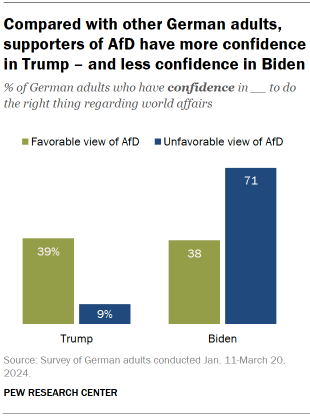
AfD supporters, like other far-right populists in
Europe, tend to have more positive views of former U.S. President Donald Trump. As the United States’ presidential election approaches, few Germans overall have confidence in Trump to do the right thing regarding world affairs. But AfD supporters in Germany are much more likely than nonsupporters to express confidence in him (39% vs. 9%).
AfD supporters also have significantly less confidence in U.S. President Joe Biden than nonsupporters do. Around four-in-ten AfD supporters (38%) have confidence in the current president, compared with 71% of nonsupporters. (The survey was fielded before Biden was replaced by Vice President Kamala Harris as the Democratic nominee in the upcoming election.)
During the Trump administration, AfD supporters had more favorable views of the U.S. than Germans who did not support the party. For example, in 2019, 54% of Germans with a favorable view of AfD also had a favorable view of the U.S., compared with 36% of those who have an unfavorable view of the party.
Since Biden’s election in 2020, though, the two groups have expressed similar levels of favorability toward the U.S. Today, 46% of AfD supporters and 50% of nonsupporters see the U.S. favorably.
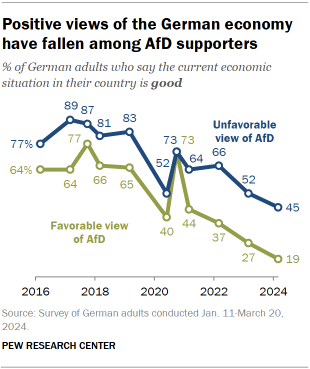
AfD supporters are much more pessimistic about Germany’s economy than nonsupporters are. Only 19% of Germans with a favorable view of the party think their country’s economy is in good shape. Among Germans who have an unfavorable view of AfD, 45% think the country’s economic situation is good.
These pessimistic views of the economy among AfD supporters mark a break from the not-too-distant past. In fall 2020, 73% of AfD supporters thought the German economy was in good shape.
Satisfaction with German democracy is lower among AfD supporters than among nonsupporters. Only 20% of Germans with a favorable view of the party say democracy in their country is working well. Among Germans with an unfavorable view of the party, 65% believe their democracy is working well.
Again, views among AfD supporters have soured in recent years. In fall 2020, 51% of those with favorable views of the party thought German democracy was working well.
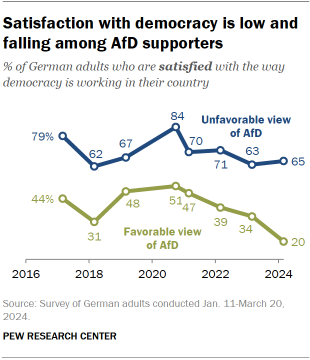
Germans with a favorable view of AfD are far less likely than nonsupporters to see the European Union favorably. Only 30% of AfD supporters have a positive view of the EU, compared with 72% of those who do not support the party.
Among AfD supporters, views of the EU have fluctuated somewhat over time, reaching a high of 53% favorable in 2022. But this share has fallen by 23 points since then, including a 16-point drop in the last year.
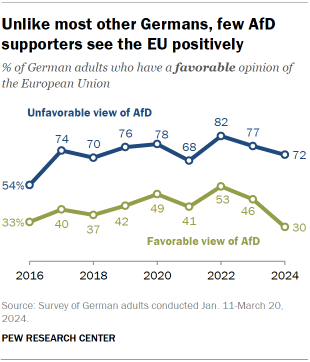
AfD supporters see key figures in the Russia-Ukraine war very differently than other Germans do. For example, AfD supporters have more confidence in Russian President Vladimir Putin than those who do not support the party (45% vs. 10%). Nonsupporters, by comparison, have much more positive views of Ukrainian President Volodymyr Zelenskyy (61% vs. 31%). AfD has campaigned against weapon deliveries to Ukraine and called for an end to sanctions on Russia.
AfD supporters also stand out for having significantly less favorable views than nonsupporters when it comes to NATO (39% vs. 71%).
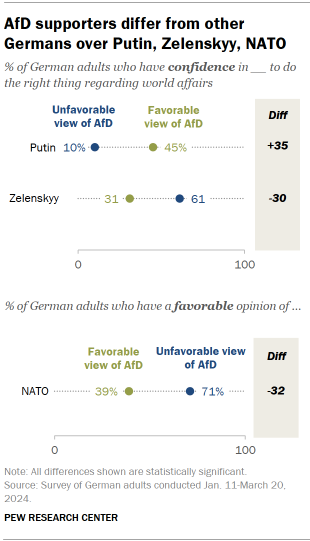
Related: NATO Seen Favorably in Member States; Confidence in Zelenskyy Down in Europe, U.S.
Note: Here are the questions used for the analysis, along with responses, and the survey methodology.